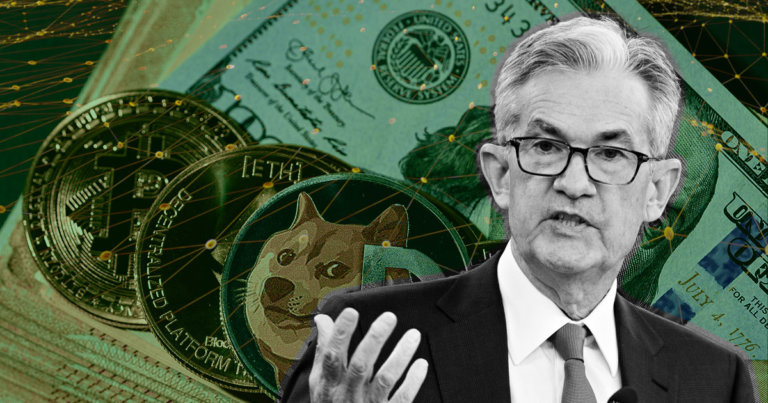 DeFi needs to be regulated ‘carefully and thoughtfully,’ says Fed chair Jerome Powell
DeFi needs to be regulated ‘carefully and thoughtfully,’ says Fed chair Jerome Powell DeFi needs to be regulated ‘carefully and thoughtfully,’ says Fed chair Jerome Powell
Powell said that central banks will always be the main trust anchor behind money and stablecoins borrow the trust from the underlying issuer.

Cover art/illustration via CryptoSlate. Image includes combined content which may include AI-generated content.
U.S. Federal Reserve chair Jerome Powell urged lawmakers to be cautious when regulating decentralized finance (DeFi) while speaking at a roundtable conference organized by the central bank of France on Sept. 27.
Powell said that regulation should be introduced “carefully and thoughtfully,” and that regulators have to be,
“…very careful about how crypto activities are taken within the regulatory perimeter.”
Powell was joined by Christine Lagarde, European Central Bank President, Agustin Carstens, general manager at Bank for International Settlements (BIS), and Ravi Menon, managing director of the Singapore Monetary Authority (MAS). The central banking leaders discussed how central banks can address financial stability challenges posed by DeFi.
Carstens of BIS said that DeFi has “structural problems” and “intrinsic weaknesses,” but that does not mean that “the technology that is behind DeFi is not useful.” Therefore, regulators need to find ways “to make good use of them.”
Agreeing with Carstens, Powell said that there are “very significant issues around lack of transparency” in the Defi ecosystem.
At present, the links and interaction between DeFi and the traditional financial system are limited, Powell said. Therefore, the ongoing crypto and DeFi winter did not have any “significant effects on the traditional banking system and the broader financial stability.”
He added:
“I think it demonstrates the weaknesses and the work that needs to be done around regulation, carefully and thoughtfully, and gives us a little bit of time.”
According to Powell, in the future, crypto markets will grow large enough to disrupt financial market stability, which is why “there is a real need for more appropriate regulations.” Powell’s cautious approach is in line with California Governor Gavin Newsom, who vetoed a bill last week, stating that crypto regulation needs to be “more flexible” and cannot be “premature.”
Powell said that the Federal Reserve favors “responsible innovation,” including in crypto-related products. The FedNow service, for instance, is due to be rolled out in a year, Powell said. FedNow will enable real-time payments through banks.
He added:
“The whole point of regulation, of course, is to create a level playing field that will allow us to reap the benefits of true innovation while avoiding the pitfalls of regulatory evasions.”
According to Powell, the approach to regulating cryptocurrencies should be ‘same risk, same regulation.’ Since many crypto activities resemble traditional financial activities and bear the same risk, they should be similarly regulated, he said.
But, when it comes to regulating novel crypto activities — such as replacing intermediaries with smart contracts — that pose new risks, Powell said there is a:
“…lot of work and a lot of thinking to do to determine what practices are acceptable, which ones are flawed or predatory.”
Powell conceded that the technology behind DeFi has the potential to bring “improvements and efficiency” to the financial system. However, he said that many of the promised efficiencies are superficial, gained by avoiding regulatory compliance or ignoring risks.
Menon and Lagarde both said that they consider stablecoins to be different from traditional crypto assets like Bitcoin and find them to be “promising.” However, Powell said:
“The central bank is and will always be the main source of trust behind money. Stablecoins essentially borrow that trust from the underlying issuer, in many cases the U.S. dollar.”
Powell went on to say that the U.S. is in no hurry to issue a central bank digital currency (CBDC). According to Powell, the Federal Reserve will be working with Congress and the Executive Branch — both of whose approvals are required to issue a CBDC — for the next two years and building public confidence.
“We are looking at it very carefully, we’re evaluating both the policy issues and the technology issues and we are doing that with a very broad scope.”












































































































